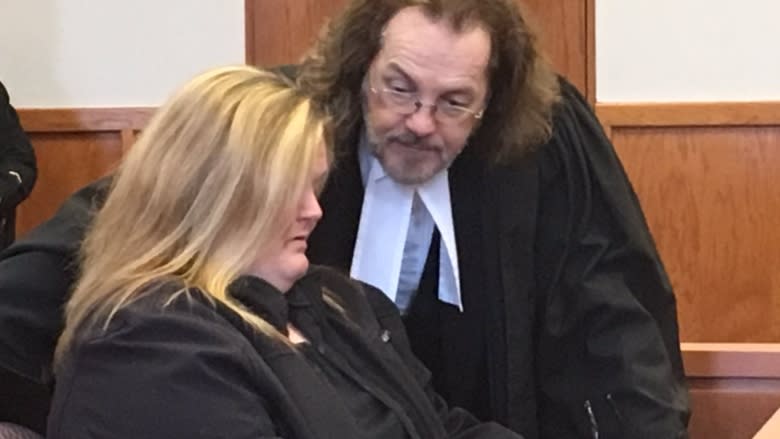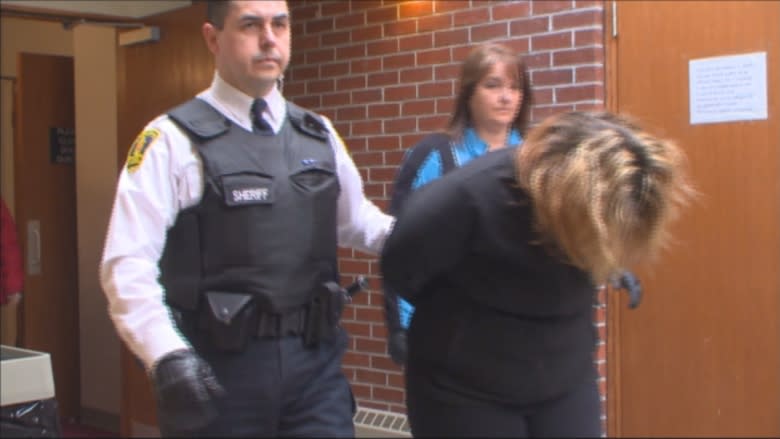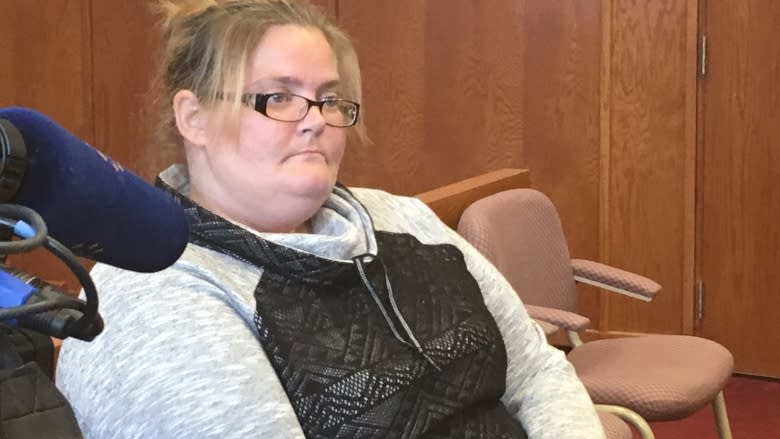RCMP coerced murder suspect into statements after arrest: judge
An RCMP constable misled a murder suspect, dismissed her requests for a lawyer, belittled her legal advice and refused her attempts to end interviews, a Newfoundland and Labrador judge has found.
Const. Trina Rideout and other RCMP officers violated Pamela Pike's Charter rights consistently in the week after PIke was arrested for the killing of Jason Skinner, Justice Donald Burrage concluded in a decision of the province's Supreme Court, released to media on Thursday.
"The cumulative impact on Ms. Pike's Charter protected right to counsel … could scarcely be more serious," Burrage wrote of one lengthy interaction between Pike and Rideout in his 137-page decision.
As a result of the ruling, originally made in March, six statements, including a re-enactment of the killing in 2013, were thrown out for Pike's trial. Pike eventually pleaded guilty to manslaughter in May and was sentenced to seven-and-a-half year sentence.
Crown prosecutors in the case told CBC News following the sentencing that the March decision to throw out the statements influenced their decision to accept a plea agreement and avoid a trial. The family of Skinner, who was killed at 34, said they wanted a trial in the case.
Denigrating and undermining
Pike was arrested April 14, 2013, and charged with murder for her involvement in the killing of Skinner in his home in Grand Falls-Windsor. Pike eventually agreed that she stabbed Skinner to death during a botched robbery attempt at his apartment.
The following morning Rideout begun to question Pike. Near the beginning of the interview, Pike asked to speak to a Vanessa McCarthy, a lawyer who Pike had spoken to the day she was arrested.
According to Burrage, Rideout told Pike that McCarthy was unavailable, and arranged for her to speak to another lawyer, despite having made no substantive effort to actually contact McCarthy — either by looking for her phone number, calling McCarthy's office or asking other police officers.
Burrage noted that Rideout was being "misleading at best," and wrote "even the most cursory of inquiries by the constable would have disclosed how McCarthy could be reached."
Through the following interrogation, which lasted more than two hours despite numerous statements by Pike that she did not want to speak, Pike asked for McCarthy at least 10 times. Rideout responded to those requests with comments that Burrage said denigrated and undermined Pike's lawyer and how useful she would be in the situation.
"It's yourself that needs to answer the questions. The lawyer, unfortunately, hasn't been there, right," Rideout said at one point, adding, "You're an adult, you need to figure out your own self," at one point and "Vanessa is not sitting there … you're the one that needs to answer to this" on another occasion.
Burrage called the comments a "disturbing practice" that lasted throughout the first week of interrogation.
He ruled that first statement was inadmissible, in part, because Rideout's actions violated Pike's right to a lawyer. He further ruled that because the other interrogations that week were also conducted by Rideout, and that they repeated conversation on various topics, they were substantially continuations of the first interrogation — and were also inadmissible in part for that reason.
Other misconduct
Throughout the week, Rideout implied that Pike could have her charges changed if she decided to speak, a tactic Burrage said has been ruled out by Canadian courts. Constable Coffin, who was the primary investigator of the case, also once made a remark that Burrage found was similar.
On one occasion, during the fourth statement, she asked Pike to sit with her and "listen this time." However, almost immediately after reading a statement from another woman charged in relation to Skinner's death, Rideout told Pike that the "jig is up" and suggested she needed to talk.
"It quickly becomes obvious that the constable's true motive is to confront Ms. Pike with Wanda's statement in an effort to obtain another incriminating statement from her," Burrage wrote. He said whatever advice she may have gotten from a lawyer about that interview would have been nullified because the situation quickly changed.
Dependency and approval
Burrage found that throughout the four days that Rideout spent interrogating Pike, Pike became dependent on her and began to seek her approval, which also calls into question whether some of the statements were offered voluntarily. The dependency was partly because Pike was kept in remand cells at the RCMP detachment, and not at the Clarenville women's prison, and Rideout had easy access to her.
"The constable in effect assumed the role of jailer. She arranged for cigarette breaks, assisted in filling out forms, arranged for medications, sent messages to family and arranged for visitation," Burrage wrote.
Pike testified that she begun to feel an attraction towards Rideout. In their first interrogation, Rideout "on several occasions" touched Pike's shoulders, held her hands or brushed her hair.
On April 18, 2013, Pike told officers she only agreed to a re-enactment of Skinner's killing because she didn't want to disappoint Rideout.
The RCMP said in a statement on Friday that they were reviewing the decision, but didn't answer questions about whether Rideout was still conducting interviews with prisoners or was disciplined in any way.
"The RCMP takes the issues raised by Justice Burrage seriously. Newfoundland and Labrador RCMP is currently reviewing the Pike investigation, and the actions of RCMP employees involved, for adherence to the law as well as investigative best practices. We will provide a further update once this review is complete," spokeswoman Laura Hepditch wrote in an email.
Crossing the line
In the six statements that were ruled inadmissible, Pike said she stabbed Skinner in self-defence, and never planned to kill him. She also said Skinner was trying to choke her.
Jon Noonan, one of the lawyers who represented Pike in her trial, said the excluded evidence did not have a big impact in the final resolution of the case.
He said this decision was unique, in that the statements and actions of the RCMP involved hit on almost every reason a pre-trial statement can be thrown out.
While admitting it's a fine line for police investigators, Noonan said he felt it was clear that Pike's rights were violated.
"The police are allowed to use tactics, to use skill, to use strategy in cracking somebody. That's all fair game, that's what society wants. But the fear is that when … any statement to an officer is coerced, the fear is that it's not a voluntary statement. That's what leads to false confessions," Noonan said.




